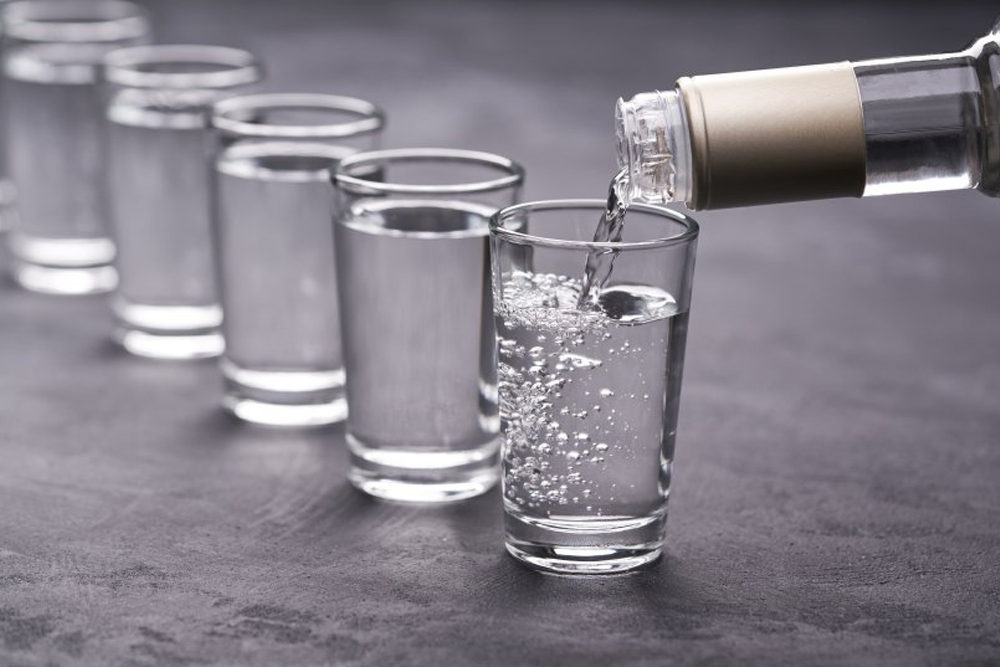Vodka is a popular kind of hard liquor around the world. Compared to other alcoholic drinks like beer and wine, vodka has a much higher alcohol concentration. Different brands of vodka range from 35% to 46% alcohol by volume, with the average at 40%.
In practical terms, this means that in a 1 liter bottle of typical vodka, it contains 400 milliliters of pure alcohol.
If you drink too much vodka at once, alcohol will build up to dangerous levels in your body. Soon enough, you may suffer from alcohol poisoning, which can be fatal.
What causes alcohol poisoning?
 Alcohol poisoning happens when you take too many shots of vodka over a short time. When the amount of alcohol becomes too much for your body to handle, you won’t be able to function properly.
Alcohol poisoning happens when you take too many shots of vodka over a short time. When the amount of alcohol becomes too much for your body to handle, you won’t be able to function properly.
How much alcohol in your body is measured through a metric known as blood alcohol content (BAC). The more vodka you drink, the higher your BAC will be. Even when you stop drinking, your BAC can keep increasing for up to 40 minutes after your last shot of vodka.
How much vodka you can drink before getting dangerous alcohol poisoning depends on your body weight, sex, and alcohol tolerance. Generally, men are more tolerant of alcohol than women, and the heavier you are, the more alcohol you can take.
What level of alcohol leads to poisoning?
First, let’s look at what one standard drink is. One drink is defined as an amount of an alcoholic beverage that contains 14 grams (0.6 ounces) of pure alcohol. In terms of vodka, which usually is 40% alcohol by volume, that is about 1.5 fluid ounces or about one shot of vodka.
As you drink more, your BAC increases progressively. Once you reach a BAC higher than 0.12, you may experience any of the following:
- Blacking out / passing out
- Choking on your vomit
- Very slow breathing
- Increased risk of accidents and injuring yourself
Usually, at BACs of 0.25 to 0.39, alcohol poisoning begins. You may lose consciousness at this point. And if your BAC climbs to 0.40 or higher, you risk a coma; or worse, your breathing could stop, leading to death.
What are the signs of alcohol poisoning from vodka?
If your blood alcohol concentration becomes dangerously high, you will experience the following:
- Unresponsiveness
- Irregular breathing
- Pale, clammy, and bluish skin
- Vomiting
- Low body temperature
- Seizures
- Confusion
- Incoherent speech and thoughts
- Coma
Once you experience these symptoms, do not wait. Call 911 or have someone call for medical help right away.
How do I help someone suffering from alcohol poisoning?
Any sign of alcohol poisoning should be considered a life-threatening event. If you are with someone, and you think they have signs of alcohol poisoning, call for medical help immediately. The sooner you get help, the more likely the person’s life will be saved.
Until the ambulance arrives, remain calm, stay with the person, and do the following:
- Keep him sitting upright
- Make sure he stays awake
Once medical personnel arrive, give them as much information as you can about what happened to the person. You may also need to provide his medical history if you can.
What happens if alcohol poisoning is untreated?
Anyone who does not seek treatment for alcohol poisoning can experience these symptoms:
- Hypothermia (low body temperature)
- Hypoglycemia (low blood sugar)
- Abnormal heartbeat
- Permanent brain damage
- Death
Who is at risk of alcohol poisoning from vodka?
 Anyone who drinks vodka, or any alcoholic beverage for that matter, can experience alcohol poisoning. If your tolerance to alcohol is quite low, you may get poisoned sooner than others.
Anyone who drinks vodka, or any alcoholic beverage for that matter, can experience alcohol poisoning. If your tolerance to alcohol is quite low, you may get poisoned sooner than others.
Young adults are particularly vulnerable, especially once they live on their own for the first time. The freedom they have means they can get into activities that involve heavy drinking, like parties and other social gatherings. Drinking games are common in college campuses, and young adults will likely face peer pressure to participate.
First-time drinkers often have no idea of their alcohol tolerance yet. If they drink heavily right away, they are more likely to suffer alcohol poisoning.
Mental health issues, like depression or excessive stress, can also contribute to alcohol poisoning. Some people who have these conditions drink vodka to cope with the negative emotions. They may drink excessively to drown out their feelings, which makes them very prone to alcohol poisoning.
Based on statistics, most deaths in the United States due to alcohol poisoning are of middle-aged men. Many of these people suffer from alcohol use disorder, meaning they have been drinking heavily for a long time already.
How is alcohol poisoning treated?
 Once in the hospital, you will be subjected to different treatments to relieve the poisoning. The treatments you get will depend on your symptoms and your BAC. If, for instance, you have difficulty breathing, you could be given a windpipe to help you breathe normally. To address dehydration and low blood sugar, which is common in alcohol poisoning cases, doctors will give you intravenous fluids to keep you hydrated and restore the lost sugar.
Once in the hospital, you will be subjected to different treatments to relieve the poisoning. The treatments you get will depend on your symptoms and your BAC. If, for instance, you have difficulty breathing, you could be given a windpipe to help you breathe normally. To address dehydration and low blood sugar, which is common in alcohol poisoning cases, doctors will give you intravenous fluids to keep you hydrated and restore the lost sugar.
If your particular case is life-threatening, doctors may order your stomach to be pumped to quickly remove as much alcohol as possible from your body. This removes the risk of further deadly symptoms.
How do I avoid alcohol poisoning from vodka?
Alcohol poisoning is easily preventable. The most effective way is to drink moderately and avoid heavy drinking. Guidelines from the Centers for Disease Control and Prevention (CDC) state that moderate drinking is having a maximum of two drinks per day for men and one drink per day for women. Anything beyond that is considered heavy drinking, which will make you more likely to suffer alcohol poisoning.
Another tip is to sip vodka slowly instead of gulping it down in one go. The slower you drink, the less severe the effects of alcohol will be. This way, you can also limit your intake of vodka per session.
Drinking with food also helps. If your stomach is not empty, it will absorb alcohol later, which minimizes its harmful effects.
